








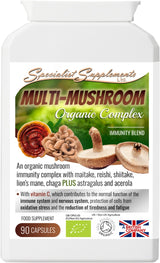
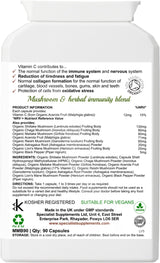
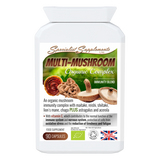
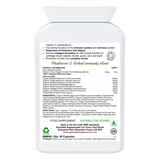
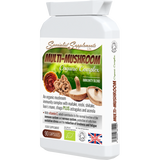
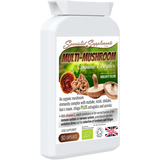
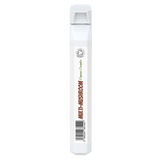
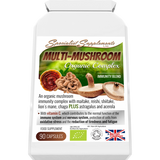
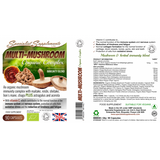
Multi-Mushroom Organic Complex
Discover the power of mushrooms with our Multi-Mushroom Organic Complex! This food supplement is a game-changer when it comes to supporting your overall health and well-being. Our blend of certified organic mushrooms includes Maitake, Reishi, Shiitake, Lion's Mane, and Chaga, as well as astragalus root, acerola fruit, and black pepper to maximize absorption and utilization of the nutrients.
Our organic mushrooms are carefully sourced to ensure the highest quality and purity, free from toxic pesticides and fertilizers. These mushrooms have been used for centuries in traditional medicine and have been scientifically proven to support immunity, cognitive health, and reduce inflammation. With the addition of astragalus root and acerola fruit, our supplement provides a range of nutrients and active compounds that are essential for maintaining good health.
Our Multi-Mushroom Organic Complex is packed with beta-glucans, polysaccharides, antioxidants, and anti-inflammatory agents, all of which are vital for supporting your immune system, reducing inflammation, and protecting your body from oxidative stress. Plus, the powerful blend of mushrooms in our supplement can help manage blood pressure, blood sugar levels, and combat chronic fatigue, while the black pepper ensures maximum absorption of all the nutrients.
Experience the benefits of our Multi-Mushroom Organic Complex for yourself and feel the difference in your overall health and well-being. With EFSA approved immunity claims and organic certification from the Soil Association, you can trust that you are getting a clean and nutrient-dense product that will support your health naturally.
-90 capsules per pot
-Pot base = 22mm x 88mm; pot height = 142mm
-Suitable for vegetarians and vegans
-Organic
-Kosher approved
-Take 1 capsule, 1 to 3 times per day or as required.
-Organic mushroom and herbal complex
Take 1 capsule, 1 to 3 times per day or as required.
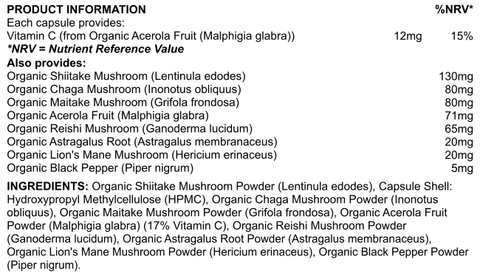
Mushrooms are fascinating organisms with a wide range of characteristics and uses. Here are some fun facts about mushrooms:
-
Not a Plant: Mushrooms belong to the fungi kingdom, not the plant kingdom. They are more closely related to animals than plants in terms of evolutionary history.
-
Mushroom Varieties: There are over 10,000 known species of mushrooms, but estimates suggest there may be many more undiscovered varieties.
-
Largest Living Organism: The largest organism on Earth is a fungus called Armillaria ostoyae. It covers an area of over 2,385 acres in Oregon's Malheur National Forest and is estimated to be thousands of years old.
-
Edible vs. Toxic: While many mushrooms are edible and delicious, some are highly toxic and can be deadly if consumed. Proper identification is crucial for foragers.
-
Magic Mushrooms: Certain species of mushrooms, such as Psilocybe cubensis, contain psychoactive compounds like psilocybin and psilocin, leading to hallucinogenic effects when ingested.
-
Bioluminescent Mushrooms: Some mushrooms, like the Mycena and Omphalotus species, can emit a faint glow in the dark due to bioluminescence.
-
Mushroom Cultivation: The cultivation of mushrooms dates back thousands of years. The Chinese were cultivating shiitake mushrooms as early as 1,000 AD.
-
Mycophobia: Fear of mushrooms is called mycophobia. This fear can be triggered by a dislike of their taste or appearance or concerns about poisoning.
-
Mushroom Uses: Mushrooms have various uses beyond culinary. They are used in traditional medicine, for dyeing fabrics, and as bio-remediators to clean up pollutants.
-
Nutritional Value: Mushrooms are low in calories and a good source of nutrients like vitamin D (if exposed to sunlight), B vitamins, and minerals like selenium and copper.
-
Fairy Tales: Mushrooms often feature in folklore and fairy tales. They are associated with magical creatures like fairies and gnomes and are seen as mystical and enchanting.
-
Mushroom "Roots": Mushrooms have a network of thread-like structures called mycelium, which function as their "roots." Mycelium plays a crucial role in breaking down organic matter in ecosystems.
-
Mushroom Spores: Mushrooms reproduce through spores, which are tiny, dust-like particles released from the mushroom cap. These spores can be used to grow new mushrooms.
-
Culinary Variety: Edible mushrooms come in a wide range of flavors and textures, from the earthy richness of portobello mushrooms to the delicate sweetness of enoki mushrooms.
-
Mushrooms in Space: In 2021, researchers aboard the International Space Station successfully grew and ate edible mushrooms for the first time in space as part of experiments on food sustainability.
Mushrooms are incredibly diverse and hold both culinary and scientific significance. Their unique characteristics and variety make them a subject of fascination for biologists, mycologists, and curious enthusiasts alike.
